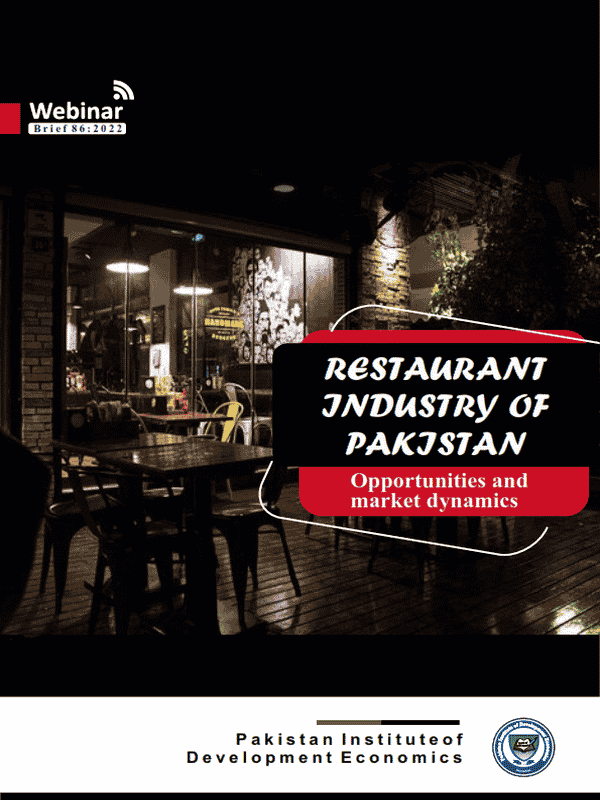Restaurant industry of Pakistan: Opportunities and market dynamics
Restaurant industry of Pakistan: Opportunities and market dynamics
Restaurants are pertinent for entertainment, cultural cuisine, celebrating life events, and much more all under one roof. Restaurants indirectly support peripheral businesses including farming, food, beverage and technology by developing business models and provide employment to millions of people. Pakistan Institute of Development Economics-PIDE hosted a webinar titled “Restaurant industry of Pakistan: Opportunities and market dynamics” in which ‘Dr. Nadeem ul Haq-Vice Chancelor PIDE’ served as a moderator. The panelists include Shakir Sharif, Manager Admin, Savor Foods, Pakistan; and Muhammad Liaquat Ali, Senior Manager Finance, Blue Lagoon, Rawalpindi.
Dr. Nadeem ul Haque started the conversation and put forward the following about the restaurant industry in Pakistan.
- What is the state of Pakistan’s restaurant industry, in terms of its affordability, market dynamics, and governance mechanisms?
- How affordable is it and what facilities are on offer for consumers?
- How much attention is paid to environmental considerations – what is the state of corporate social responsibility?
- What are the parallel industries that function in tandem with the hotel industry, serving supply side and demand side requirements?
- What impediments do restaurants and their owners face while running this business?
- Is entrance and sustenance quite easy or difficult in this business?
- What is the position of their social media outreach regarding the pandemic days?
- What are recent innovations in the area? And how can the restaurant industry be facilitated from a policy perspective?
Key points by Mr. Shakir Sharif
- The most significant roadblocks remain taxation and documentation. Restaurants, both new and old, are taxed at the same rate, which appears to be unfair to restaurant associations. While documentation takes a long time to complete, it is also time intensive.
- The government does not provide land or proper infrastructure, and it is difficult to acquire such land in any commercial area.
- There is a scarcity of human resources, particularly highly skilled labor. If it is available through any relevant organization, the cost is very high.
- The problem of hierarchy is still present in the process of transforming a single unit or restaurant into a corporate entity. Until the final is reached, the cost is maximized and can even double.
- The volume of restaurants remains low, particularly for chains and outlets, due to lower margins in this business compared to banquet halls, where margins are higher. And quality control remains a difficult task when outlets are in different cities. As a result, the outlets are usually located in the same city.
- Small and medium-sized enterprises (SMEs) face a shortage of trained employees compared to large corporations. Graduates from universities typically gravitate toward larger opportunities, leaving small-scale restaurants with untrained and unskilled employees. New employees receive 3-4 months of pre-qualification training on the pace of the restaurant.
- One of the most important aspects to monitor is organizational culture. The training or teaching from founders that becomes a success for a base is referred to as organizational culture. It must be followed and always maintained.
Key points by Mr. Muhammad Liaquat Ali
- He noted that rather than copying someone exactly, one should learn from them. To evolve, one must introduce new ideas to his work.
- Restaurants that serve the same food and do not innovate will eventually close. And in the process, capital is lost. So, there is no such thing as a supportive organization to help this industry grow.
- The Punjab Food Authority is assisting restaurants with food and employee hygiene, through its booklets and notations.
- While National Incubation Centers (NICs) have begun to provide coaching and money to startups, it is unclear whether they are specifically serving the restaurant business.
- Legality and regulation are an issue. There are no formal rules or regulating bodies in place to ensure the entry and exit of this industry.
- Newcomers are not given any formal education. They begin with an idea and start on their own way.
- The food ingredients come from all over the country, the supply chain must be smooth. Food delivery was also a problem during pandemic days.
- Notably, Food Panda and Cheetay food delivery services remained top trending. They aided in the efficient and timely delivery of goods across cities, as well as the maintenance of the supply chain.
Forward suggestions by guest speakers:
- The government must step forward to collaborate with the country’s restaurant industry and provide easy access to land and infrastructure.
- The tax system must be changed. Newcomers in this industry should not be taxed at the same rate as veterans.
- Data collection and maintenance about food supply and demand across entire cities in the country is extremely difficult for restaurants. The government must step forward to collect and distribute such data to restaurants so that the industry can thrive by developing more restaurant chains.
- The last but not the least, while running a business, corporate social responsibility must also be prioritized.




